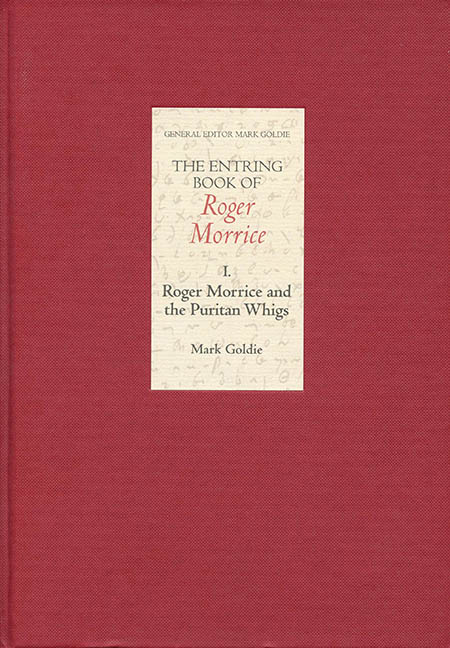Book contents
- Frontmatter
- Contents
- List of Illustrations
- Foreword
- Preface
- Notes on the Editors
- Acknowledgements
- Reader's Guide
- Abbreviations
- Genealogical Tables
- Maps
- Maps
- 1 Politics and Religion in the Era of the Entring Book
- 2 Roger Morrice: Fragments of a Life
- 3 The Text of the Entring Book
- 4 Puritan Whigs
- 5 Country Whigs
- 6 Middle-Way Religion
- 7 The History of the Puritans
- 8 Epilogue: The Entring Book and the Historians
- Appendices
- Bibliography
- Index
7 - The History of the Puritans
Published online by Cambridge University Press: 07 October 2017
- Frontmatter
- Contents
- List of Illustrations
- Foreword
- Preface
- Notes on the Editors
- Acknowledgements
- Reader's Guide
- Abbreviations
- Genealogical Tables
- Maps
- Maps
- 1 Politics and Religion in the Era of the Entring Book
- 2 Roger Morrice: Fragments of a Life
- 3 The Text of the Entring Book
- 4 Puritan Whigs
- 5 Country Whigs
- 6 Middle-Way Religion
- 7 The History of the Puritans
- 8 Epilogue: The Entring Book and the Historians
- Appendices
- Bibliography
- Index
Summary
England and the Swiss Reformers
ROGER Morrice's dearest ambition was to write the history of the Puritans. He failed. However, he left behind a massive corpus of manuscripts that became indispensable to future attempts, exploited by historians from the time of Daniel Neal, in The History of the Puritans (1732–8), to that of Patrick Collinson, in The Elizabethan Puritan Movement (1967), and beyond. It is not the Entring Book, but rather his collection of older documents, together with his notebooks and drafts towards his ‘politico-ecclesiastical’ history of England since the Reformation, that constitute the bulk of Morrice's surviving papers, and upon these this chapter is chiefly based. We cannot say what prompted him to embark, early in the 1690s, on a history of the Puritans, but plausibly it was at the encouragement of Richard Baxter. Such a project had been a desideratum among Dissenters for some time. In 1661 Baxter had received a plea from Matthew Newcomen : ‘O that yourself, Mr [Simeon] Ashe, Mr [William] Cooper &c would join together to compile the history of the Nonconformists from the teachers of Frankfurt to this day. It would be a noble work tending much to the glory of God and the understanding of his reproached people.’ Such a history, as Newcomen indicates, would serve as witness to, and vindication of, a godly cause. Crucially, it would prove that the Puritans were not marginal to, nor rebels against, the English Church, but a pure stream flowing from the fountainhead of the Reformation, ‘the teachers of Frankfurt’, the Marian exiles of the 1550s, a stream that had flowed into the broad river of the Elizabethan establishment. Baxter did publish a Church History in 1680, though its subject matter was the history of episcopacy in the universal Church down the ages. Here, as elsewhere, he insisted upon his spiritual ancestry among the revered Puritans of the Elizabethan and Jacobean eras - Thomas Cartwright, Richard Sibbes, John Preston, Arthur Hildersham - men who were not separatists or schismatics but of and in the national Church. Morrice's history was intended to be cast in the same mould.
- Type
- Chapter
- Information
- The Entring Book of Roger MorriceRoger Morrice and the Puritan Whigs, pp. 269 - 307Publisher: Boydell & BrewerPrint publication year: 2007



